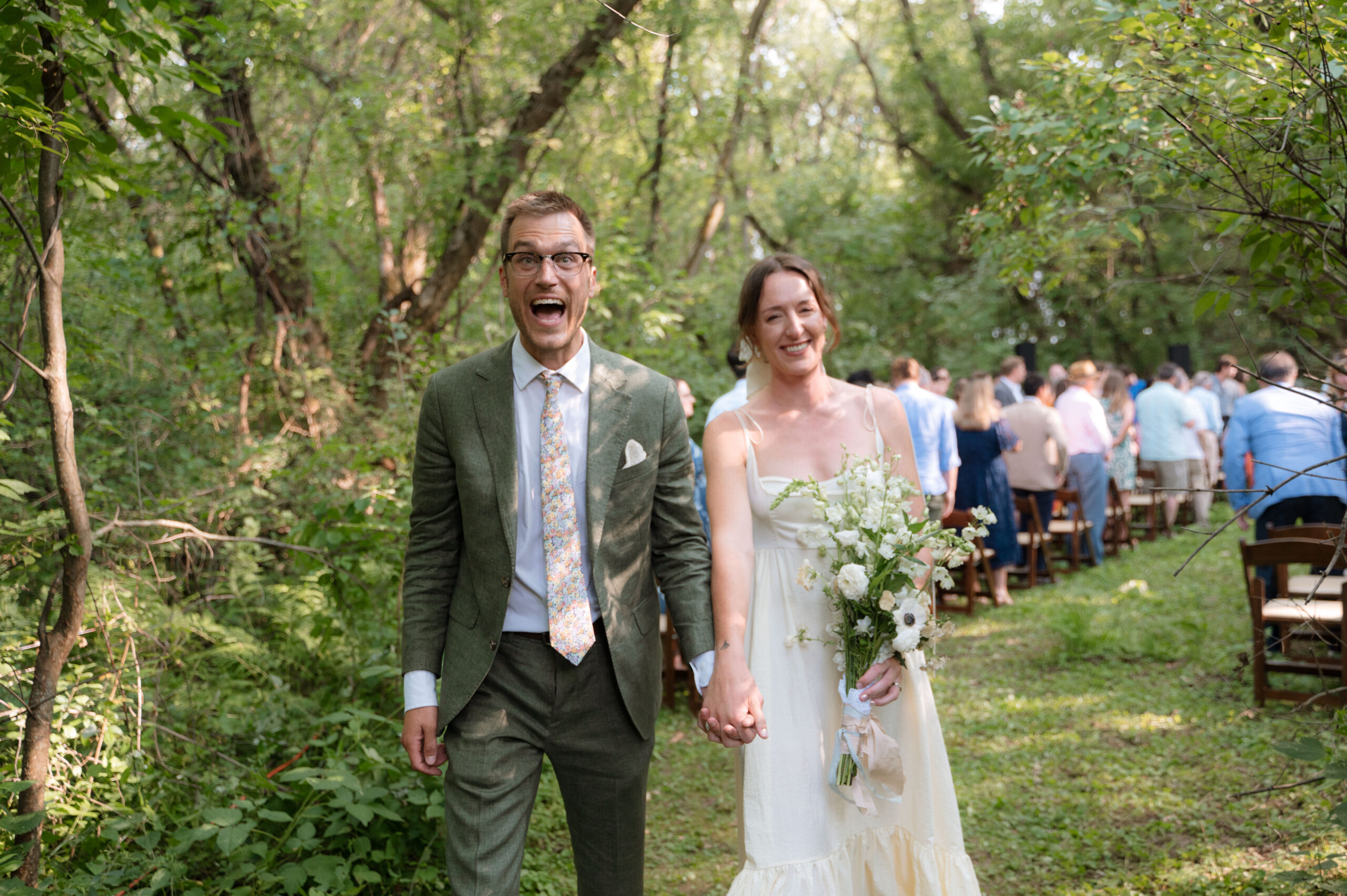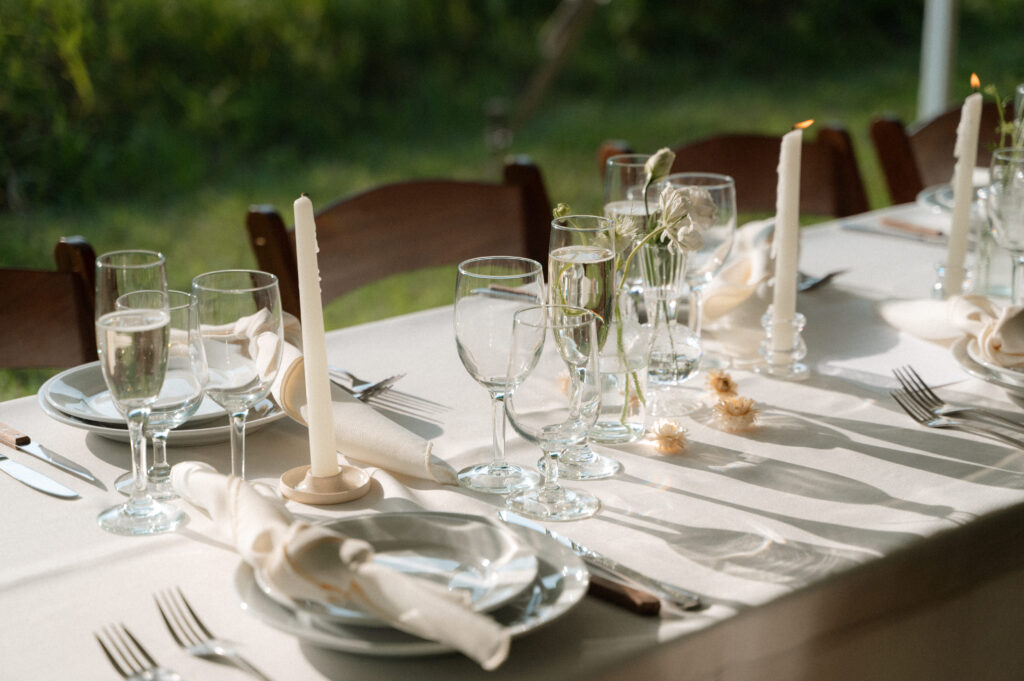Sustainable Wedding Planning: 13 Tips for Eco-Conscious Couples

Eryndae Thorvaldsen
April 30, 2024
Planning your dream wedding without compromising your sustainable values? You’re in the right place. Sustainable weddings have become increasingly popular as couples seek meaningful ways to celebrate love while reducing their environmental footprint.
Now, as a wedding photographer with a degree in environmental studies, I bring a unique blend of expertise to the table. Through my work at weddings, I’ve gained practical experience that, combined with a deep understanding of environmental principles, enables me to offer valuable insights and guidance. This knowledge ensures you can create an eco-friendly wedding experience without compromising on the day’s experience.
If you’re looking to minimize waste, support sustainable practices, and make environmentally conscious choices for your wedding celebrations, these 14 practical tips are crafted with the knowledge and experience to guide you seamlessly through the process.

1. Prioritize What Matters Most
Begin your eco-conscious wedding planning journey by identifying the aspects of your celebration that hold the most significance for you and your partner. By focusing on what truly reflects your love story, you can reduce unnecessary elements that contribute to waste. For example, if mailed wedding invites are essential to you (use Paper Culture for a sustainable choice), consider skipping other traditional items like confetti tosses or excessive guest favors, which often end up unused and contribute to environmental waste.
2. Keep it Intimate
Hosting a smaller, more intimate wedding not only fosters a closer connection among guests but also significantly reduces the environmental impact of your event. With fewer attendees, you can minimize resource consumption, waste generation, and energy usage. Intimate weddings often allow for more personalized experiences and thoughtful touches while promoting sustainability through conscious guest management and event planning.
3. Choose a Sustainable Venue
When selecting a wedding venue, prioritize locations that demonstrate a commitment to sustainability. Look for venues with responsible recycling and composting practices, as well as those that minimize single-use decorations by offering natural backdrops or reusable decor options. Consider venues that provide shuttle services or encourage carpooling to reduce emissions, especially if your wedding is outdoors and guests need transportation.
My top recommendations –

4. Support Sustainable Vendors
Choose sustainably minded vendors for planning (Honeyhill Weddings), catering (Chowgirls), floral arrangements (Pansy Floral), photography (Eryndae Photography), and other services to support your community and reduce transportation emissions. Sustainably minded vendors often use seasonal and sustainable ingredients, support ethical practices, and prioritize eco-friendly options. This creates a positive cascading effect on the environment and local economy.
5. Go Digital with Invitations and Information
Embrace digital alternatives for wedding invitations, save-the-dates, and RSVPs to reduce paper waste. Online platforms like Bliss & Bone or Minted offer eco-friendly options for sending electronic invites and managing guest responses efficiently. Digital invitations not only save trees but also streamline communication, ensuring that important details reach your guests promptly without the need for physical mail.
6. Consider an Eco-Friendly Registry
Explore eco-conscious gift registry options that align with your values, such as platforms like Everlastly or The Good Beginning. These platforms allow you to register for sustainable products or experiences while also providing opportunities for guests to donate to environmental nonprofits on your behalf. Choosing an eco-friendly registry promotes conscious consumerism and supports causes that are meaningful to you and your partner.
7. Offset Travel Emissions
If you’re planning a destination wedding or have guests traveling from afar, consider investing in carbon offset options. Services like TerraPass or MyClimate can help offset the carbon emissions associated with travel, including flights and transportation. Encourage guests to carpool, use eco-friendly transportation options, or participate in carbon offset programs to collectively reduce the environmental impact of travel-related emissions.


8. Embrace Second-Hand
Incorporate second-hand items into your wedding decor, attire, and accessories to reduce waste and promote sustainability. Consider vintage or heirloom wedding rings (check out Filigree in North Loop), pre-loved wedding attire (my favorite Happy Isles), and thrifted decorations for a unique and eco-friendly touch. Companies like Aurate, Mejuri, or Bario Neal offer responsibly sourced jewelry options, while thrift shopping can uncover hidden treasures for your wedding day.
9. Rent Instead of Buying
Opt for rental services for items that you may only use for your wedding day, such as decor, tableware, and specialty items. Renting reduces the need for purchasing new items that may contribute to post-event waste. Consider working with companies like The Fond Collective or Boho Rental Co. Some companies even offer dress rental options, allowing you to wear a one of a kind outfit without the long-term commitment or environmental impact of buying a new dress. When we think about weddings, we also have to consider all the events leading up to the day and what positive impact we can make with every choice.

10. Opt for a Plant Based Menu
Consider serving a plant-based menu or incorporating vegan and vegetarian options into your wedding meal. Plant-based menus require fewer resources and have a lower environmental impact compared to traditional meat-heavy menus. Collaborate with local caterers who offer delicious and sustainable options using organic, seasonal, and locally sourced ingredients. Chowgirls is my favorite caterer in the Twin Cities area that is unmatched when planning for sustainability.
11. Use Eco-Friendly Send-Offs
Choose eco-friendly alternatives for send-off items, such as dried flowers, to minimize waste and environmental harm. Dried flowers are biodegradable and gentle on the environment, making them an eco-conscious choice for post-ceremony celebrations. Instead of traditional rice or birdseed, opt for bubbles. Use biodegradable bubble solutions to minimize environmental impact.


12. Minimize Waste
Plan ahead to minimize waste during and after your wedding festivities by implementing sustainable practices. Donate leftover flowers to hospitals or nursing homes to brighten someone’s day and extend the lifespan of floral arrangements. Coordinate with your catering company to participate in food rescue programs (a personal favorite – Luum Collective) or arrange for food donations to reduce food waste. Set up compost bins for food scraps and opt for compostable or reusable tableware to reduce landfill waste.
13. Sell or Donate Afterward
Continue the cycle of sustainability by selling or donating wedding items after your celebration. Platforms like Facebook Marketplace offer opportunities to sell or purchase gently used wedding decor, attire, and accessories. By giving these items a second life, you contribute to a circular economy and reduce the environmental impact of disposable wedding goods. Consider donating proceeds to environmental charities or local nonprofits for added impact.



By incorporating these tips into your wedding planning journey, you can create a beautiful and memorable celebration that aligns with your eco-conscious values. Cheers to a sustainable and love-filled wedding day!
Remember, you don’t have to do everything perfectly to make a positive impact. Every eco-friendly choice counts toward a more sustainable future.